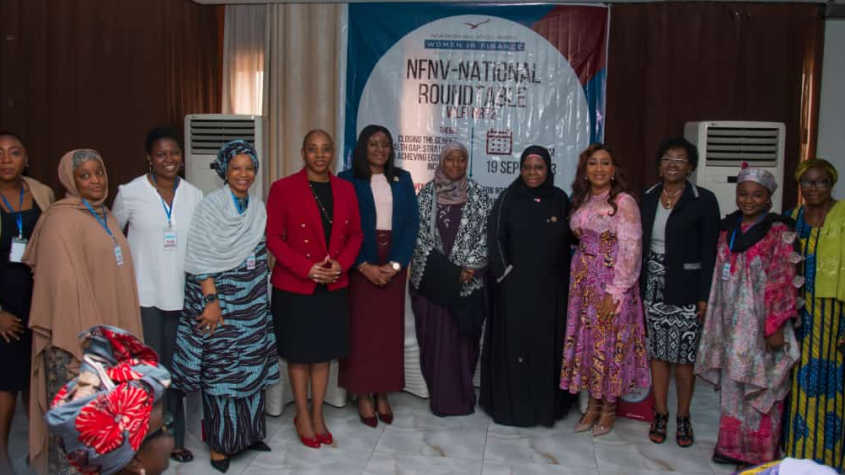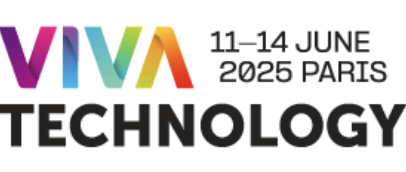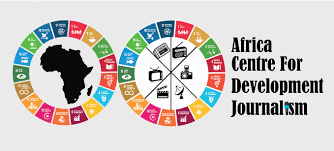INDEPTH | WLFI-NRT2: Towards Closing Wealth-Gender Gap in Nigeria
The Nigeria chapter of New Faces, New Voices (NFNV-Nigeria) hosted its 2nd National Roundtable on Women Leadership and Financial Inclusion (WLFI-NRT2) last week, focused on bridging Nigeria’s wealth-gender gap and boosting women’s roles and influence in the country’s financial industry.
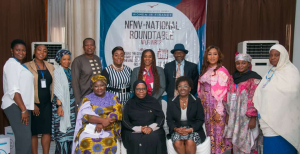
New Faces New Voices (NFNV) is a pan-African women in finance network under the Graça Machel Trust (GMT) focused on promoting changes in the financial sector by ensuring Africa benefits from women’s economic potential and empowering women to contribute to a crucial shift in the business and financial landscape across the continent.
The WLFI-NRT2 roundtable, themed “Closing the Wealth Gender Gap: Strategies for Achieving Economic Inclusion,” was part of activities under Phase II of NFNV Nigeria’s Women Leadership and Financial Inclusion (WLFI) Project. The roundtable examined the financial hurdles to cross in order to close the wealth-gender gap in Nigeria and evaluated policies and initiatives necessary for closing the wealth-gender gap in the country.
Recall that in March 2022, NFNV-Nigeria held its first national roundtable, themed “Building an inclusive financial ecosystem for women-led businesses in Nigeria—post-Covid-19.’’ The maiden roundtable evaluated the level of inclusiveness of the Nigerian government’s financial policies and interventions aimed at mitigating the impact of the pandemic on women-owned businesses and ensuring gender-inclusive post-Covid-19 recovery efforts.
On the other hand, WLFI-NRT2 assessed policies and programs aimed at closing the wealth-gender gap in Nigeria, examined the socio-economic ecosystem necessary to foster gender-sensitive public and private policies for achieving SDGs 5 (Gender Equality) and 8 (Decent Work and Economic Growth) in Nigeria, as well as proposed actions to ensure functional and implementable strategies for economic inclusion in Nigeria.
“NFNV Nigeria playing a pivotal role in championing women’s financial inclusion” – Mrs Aishatu Aminu
In her welcome address, Mrs Aishatu Debola Aminu, Country Director of NFVN-Nigeria, said 133 million Nigerians were trapped in multidimensional poverty, adding that these deepening economic inequalities had further widened the country’s wealth-gender gap. She said closing Nigeria’s wealth-gender gap was not just a moral imperative but a strategic necessity for the nation’s economic growth and development.
To this end, Mrs Aminu lauded the Central Bank of Nigeria’s National Financial Inclusion Strategy (NFIS), among other financial inclusion policies. “These efforts have yielded progress, with more than half of Nigerian adults now accessing formal financial services, which is indeed a positive step forward. However, there is much work to be done, as we must build on these achievements and explore innovative strategies to ensure that women, in particular, are adequately included in the economic landscape.”
She said NFNV-Nigeria was also playing a pivotal role in championing women’s financial inclusion in Nigeria, describing Nigeria’s 130th ranking in the Global Gender Gap Report 2023 as a clear indication of the challenges women were grappling with in the country. She said it was essential for this gap to be bridged for Nigeria to achieve Sustainable Development Goals 5 (Gender Equality) and 8 (Decent Work and Economic Growth).
“I want to express my gratitude to all participants for your commitment to this vital cause. Your expertise and insights will be invaluable in shaping the future of economic inclusion in Nigeria. In conclusion, let us approach this day with an open mind and a shared determination to make a difference. Together, we can chart a course towards a more equitable and prosperous Nigeria,” she told the delegates.
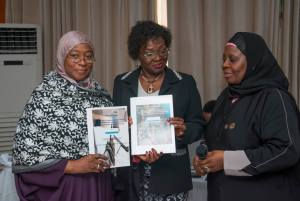
“I’m proud of NFNV Nigeria’s promotion of financial inclusion” CBN Deputy Governor
While delivering the WLFI-NTR2’s keynote address, Ms Aishah Ahmad, CBN’s Deputy Governor for Financial System Stability (represented), said a lack of savings and knowledge of banking systems had led to numerous losses by women during the Covid-19 pandemic, adding that although Covid-19 forced many women to adopt banking, the fact that they lacked basic financial literacy made them vulnerable to fraudsters.
Ms Ahmad said the Sub-Saharan African region ranks 6th among the world’s 8 regions with a 68.2% score on the recent gender gap index, ranking slightly below the global average of 68.3%, while Nigeria scored 63.7%, dropping by 0.002% points compared to the preceding year. She applauded the NFNV Nigeria’s efforts to promote equitable economic inclusion through the WLFI project.
“There is plenty of evidence and research that provides the justification for expanding women’s financial access and economic participation. There is also evidence of a lower risk profile for female businesses, as several studies have shown that there is a lower default rate and a higher deposit coverage rate for loans made to women. Moreover, women are more likely to invest a significant proportion of their earnings in the development of their families and communities,” the CBN chief said.
Ms Ahmad said the CBN was working through the NFIS to foster financial inclusion and address the gender gaps in access to finance, noting that the imperative for enhancing Nigeria’s wealth-gender gap included improving account opening measures for women, financial and digital literacy, as well as improving access to digital financial solutions.
“Closing the wealth-gender gap a matter of social justice” – Mrs Graça Machel
In her goodwill message, Mrs Graça Machel, GMT’s Founder, who was represented by Ms Shiphra Chisha, GMT’s Director of Programs, described as regrettable the fact that the world over, women have been marginalized and left behind in various aspects of economic and social development.
Mrs Machel said going forward, women must be actively engaged as active decision-makers in correcting the mistakes of the past and building a more equitable and sustainable future where no one is left behind. “The choice before us as a continent is clear: we either leave women, who are half of our army, perpetuate these injustices, or prioritize gender-responsive policies and inclusive adaptation strategies in our energy transition and economic inclusion efforts.”
“Let us ensure that the benefits of economic inclusion are shared by all, regardless of gender and ensure that women play a central role in shaping our pathway moving forward. Not doing this is only inviting an extended period of growth drought, economic slowdown, social imbalances and adverse effects that will continue to affect our children, youth and men, in the long run,” Mrs Machel admonished.
The GMT chief described closing the gender wealth gap as a matter of social justice, adding that closing the gap in Nigeria would be an economic game changer, one that would result in higher growth productivity and greater economic stability. To achieve full gender parity in Africa, she said countries must address structural barriers that discriminate against women and girls in the areas of access to education, employment, finance as well as financial services.
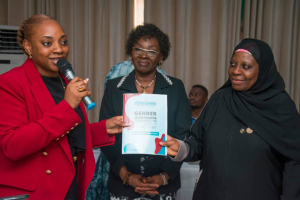
“My work with NFNV Nigeria improves lives of Nigerian women.” – Dr Sambo
In her goodwill message, Dr Amina Namadi Sambo, NFNV-Nigeria’s Grand Patron, described the roundtable as timely, adding that the fact that the 2023 Global Gender Gap Report showed an overall progress of 0.3% in terms of efforts to achieve gender parity compared to the previous year was still worthy of recognition. She said even though the improvement seemed like a little one, it was still progress in the right direction.
Dr Sambo added that African countries were not left behind in terms of efforts to close the gender gap reiterating that although Nigeria wasn’t among the top 10 countries in the world, the continent as a whole did achieve a significant improvement towards closing the gender gap, according to the report. She therefore described the roundtable as a platform to deepen awareness about the gender-wealth gap as well as a call to action for stakeholders to expedite actions to bridge the gap.
The NFNV Nigeria Grand Patron said her personal NGO, the I-Care Women and Youth Initiative (ICWYI), was also working to bridge the endemic gender gap in Nigeria to ensure better lives for women and girls by addressing cultural, religious, economic barriers. Also, she noted that her relationship and cooperation with NFNV-Nigeria as its Grand Patron have blossomed over the years and helped improve the lives of Nigerian women.
“Achieving gender parity requires collaboration.” Ms La’Kerri Jackson
In her own goodwill message, La’Kerri Jackson, Global Director of Social Impact at United Parcel Service (UPS), recalled the inspiring history of her organization and its founder, Jim Casey, an enterprising young entrepreneur who created his delivery service company in a basement with a $100 loan to support his widowed mother, which eventually became the world’s largest package delivery service and logistics company, currently operating in more than 220 countries and territories.
Ms Jackson said UPS was committed to advancing the cause of women in business and entrepreneurship, out of the belief that women were the backbone of every community. She noted that no one company, organization, or country can solve the prevailing gender discrimination in the world; rather addressing gender inequality requires collaboration, which was why UPS was working with partners such as NFNV Nigeria to create life-changing opportunities for women around the world.
“These partnerships enable us to empower women entrepreneurs through events like this national roundtable and financial inclusion programs, which not only support their economic advancement but also contribute to overall economic growth and social development. It’s essential that we take a holistic approach that combines financial services with education, training, and mentorship to ensure that women can make the most of the opportunities provided,” Ms Jackson urged.
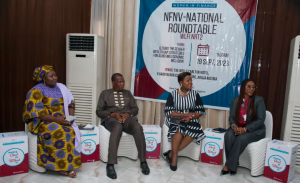
“Nigeria’s economic policies create a difficult work environment for women,” – Ms Akintomide
Ms. Cecilia Akintomide, former Vice-President/Secretary-General at the African Development Bank (AfDB) cum NFNV-Nigeria Trustee, said in her presentation titled “Bridging the Wealth Gap through Gender Smart Economics,” women globally still earn 20% less than men for the same work, noting that Namibia and Rwanda were the only African countries among the top 10 countries in terms of efforts to close the gender gap globally.
“Nigeria has a pronounced gender-wealth inequality, which can be attributed to financial illiteracy, a lack of access to paid work, reduced access to education, a lack of adequate property ownership as a result of culture and tradition, and life events. Our current economic policies have created a challenging work environment for women. Closing the gender-wealth gap may be like a bitter pill, but it is a key step to economic recovery.
For Nigeria to close the existing wealth-gender gap, Ms Akintomide said institutions must be deliberate and intentional about bridging the gap by committing to gender-based preferences that favor women in procurement. “We can use that as a means to advocate for the government. If, for instance, the government allocates 30% of procurement to women, it will, by a large margin, close the gender gap.”
The highpoints of the WLFI-NTR2 roundtable were the launch of a series of policy documents and research reports by dignitaries at the event. Among others, the documents launched included a Public and Private Procurement Policy; Gender Mainstreaming Toolkit, by Ms Ngover Ihyembe-Nwankwo, Executive Director for Business Development at Nigeria Inter-Bank Settlement Systems (NIBSS).
Others were documents related to GMT’s Expert Leaders Group (ELG) on Women’s Financial Inclusion, a network of past and present African Female Deputy Governors of Central Banks, by Ms Aishah Ahmad, the CBN’s Deputy Governor for Financial System Stability; the NFNV-Nigeria Accountability Tracker, by Ms. Cecilia Akintomide as well as a Research and 2 Reports, by Alhaji Garba Abubakar, the Registrar-General, Corporate Affairs Commission (CAC).

